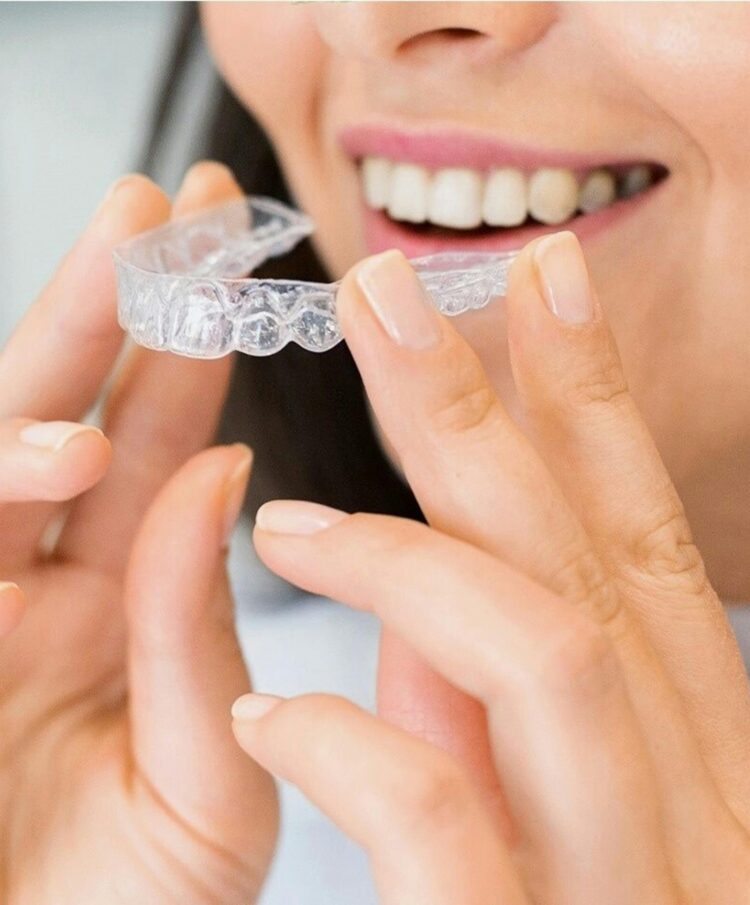I never thought I’d be wearing braces at the age of 42 but when it comes to having a confident smile, it’s definitely a case of ‘better late than never’
I love photos. I take loads of them – my family, my dogs, days out, events, holidays, reunions, anniversaries, beach walks. I create a photo album every year and do monthly roundups on Instagram.
I’m often in these photos (who doesn’t love the occasional selfie?) but over the last five years or so, I’ve found myself increasingly distracted by my teeth – most notably one snaggle tooth in my top row.
Of course, when I said it to anyone, they would reply that I was the only one who was aware of it and they only saw it because I pointed it out. Despite their reassurances, my eye was always drawn to it in every photo.
This wasn’t a major issue for me in my teens and early twenties. I noticed the snaggle tooth but it wasn’t until my thirties that it started to seem more pronounced. I don’t think I was aware that teeth continue to move, shift and even change shape as we age thanks to wear and tear, grinding, chewing, tooth loss or genetics.
For years, I just assumed that it was too late for me to do anything about it. That braces were something teenagers got to acquire an attractive mouthful of teeth before setting out on the journey of life. Then, gradually, I began to hear of more people in their 30s and 40s getting it done. First it was a cousin, then a friend and before I knew it, I had started researching if I might be a suitable candidate.
Something else I should mention is that I have always had problems with my teeth. It harks back to a fairly serious pick ‘n mix addiction in my late teens and early twenties (genuinely) and as a result, I have more fillings than I can count, a crown, a root canal and a very real fear of the tiny dental drill!
At the start of 2024, after a basic teeth cleaning and checkup, I noticed that my lower teeth had shifted a lot. I was told that, as they became more crooked, my brushing and flossing routine simply wasn’t getting the job done. The increasing buildup of plaque was worrying and, after they gave me some Interdental Brushes, I was referred to a periodontist for a sobering chat about gum disease.
After a lot of thought, and realising that it would be of benefit to the health of my teeth, as well as how they looked, I decided to bite the bullet at the age of 41 and get Invisalign through clearbraces.ie at Gleeson Dental in Killarney, Co Kerry.

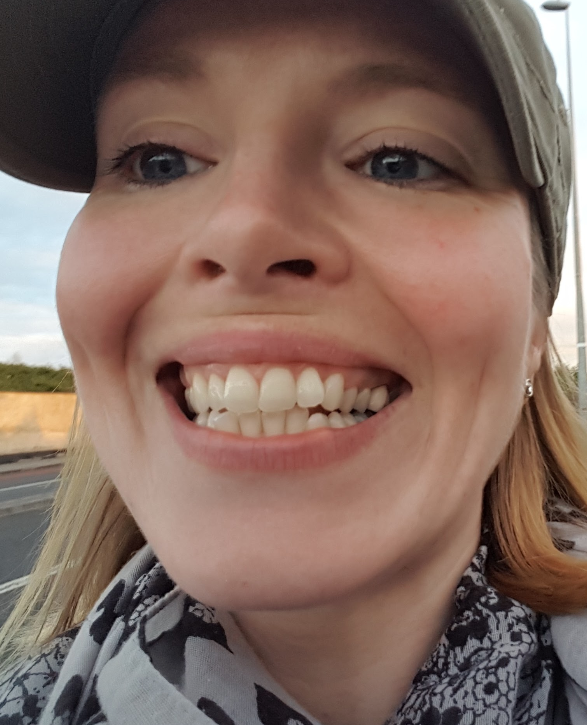

What exactly is Invisalign?
Put simply, Invisalign is the process of wearing a series of clear, removable aligners that gradually straighten your teeth. There are no brackets and wires involved, and none of the restrictions that come with traditional metal braces. They have to be removed every time you eat or drink something other than water.
What’s involved in getting Invisalign?
There are several steps you must take before you get your clear braces but they are simple and don’t take long once you get the ball rolling.
- A full dental check up
It’s really important to get a cleaning and deal with any dental work that needs to be done, ie. fillings etc., before starting the Invisalign treatment.
- Taking scans for the aligners
Using the iTEro scanner my dentist, Dr Katie Gleeson, took a fast and precise 3D digital scan of my teeth along with radiographs and a full intra oral examination which allowed her to customise my treatment plan. This is a little uncomfortable as it involves a wand being moved across every tooth to get an exact reading of where it is in your mouth. However, it is also the scan that allows them to create the “Before and After” face visualisation which is called the Invisalign Outcome Simulator Pro and is very cool!
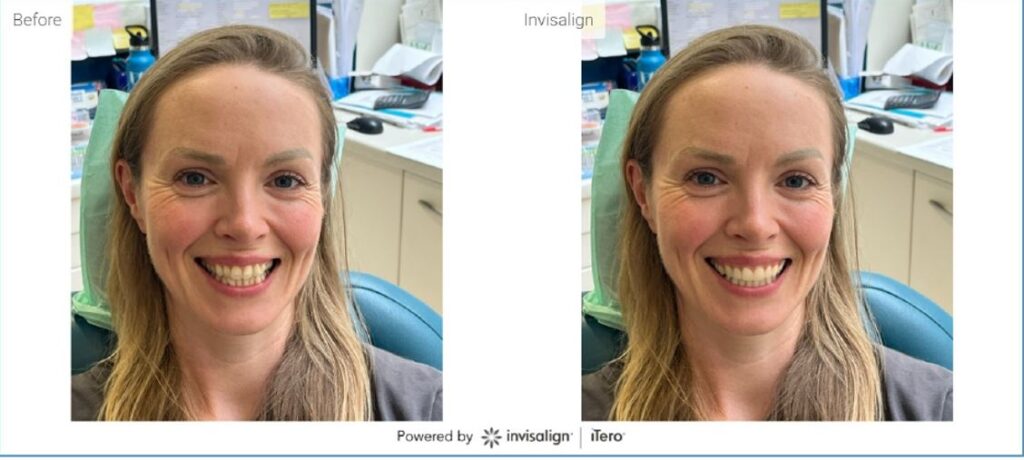
- Reading and signing the paperwork
There is a bit of paperwork to read and sign before you can start your treatment. It’s really important to read this fully and, if anything is bothering you, make sure you ask questions or query it before signing the document. The main things to be aware of are:
1. Aligners are meant to be worn for 22-23 hours a day.
2. Attachments (or buttons) are small composites placed in certain positions on the patient’s teeth to assist with particular tooth movements.
3. Some patients will require IPR (interproximal reduction), which is filing that is carried out to help relieve crowding. This sounds scarier than it is – I’ve had it done and can confirm that it feels like flossing with sandpaper. Strange but not painful.
4. Patients are usually seen every six weeks to review progress and additional aligners may be required at the end of the first set of aligners.
- Arranging a payment plan
Getting your teeth straightened is not cheap but it’s an investment in your dental health, your confidence and how you feel about your smile for the rest of your life. The cost of the treatment is based on your specific needs including duration of treatment and the type of correction you’re requesting. It will be determined by your dentist and discussed with you before you commence treatment. The average cost tends to be between €2,500 and €4,500.
- Committing to dentist’s visits every six weeks
Make sure you’re available to attend a dentist’s appointment every six weeks for the duration of your treatment. This visit allows for a check up to see that everything is going according to plan, make any necessary adjustments and, in my case, to get the next three pairs of aligners. I change mine every two weeks.
The pros and cons
Pros
They didn’t hurt as much as much as I thought they would
The aligners definitely feel a little strange when you put them in first and there is a tiny bit of discomfort on Day 1 of wearing each new pair. But after that, I barely noticed them and, to my surprise, came to really like wearing them – they almost felt like a security blanket after a while!
They are great for curbing excessive snacking
I cannot express enough how much you rethink your snacking with these aligners in your mouth. I’m allergic to hassle so I have to really, really want that cup of tea and chocolate if I’m going to go through the palaver of taking them out and having to brush my teeth five minutes later.
After a while, they feel quite good
I get such satisfaction in clicking the aligners into place every time I press them into my teeth. They feel snug, I know they’re doing all the work, and my teeth feel shielded and secure.
You become better at looking after your teeth
Before, I used to just brush my teeth in the morning and at night but now that I have to clean them after every meal, I can’t imagine not doing it in future. The aligner carry case may go, but the toothbrush and toothpaste will stay in my handbag from now on!
You can watch the transformation in real time
Honestly, I didn’t notice any difference in my teeth for months. But then, at the end of April, I looked at my bottom row of teeth and realised that the four in front were almost fully back in line with the rest of them. In June, I got a fresh set of aligners that felt extra tight on my ‘snaggle’ tooth and in the last few weeks, I’ve really seen a change in that one too. I had to have filing done to create space in my front teeth so I know that I’ll see even more cohesion in the coming weeks. Bring it on.
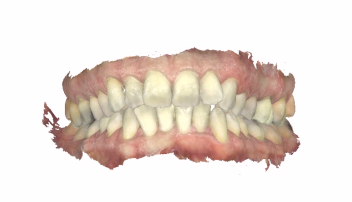
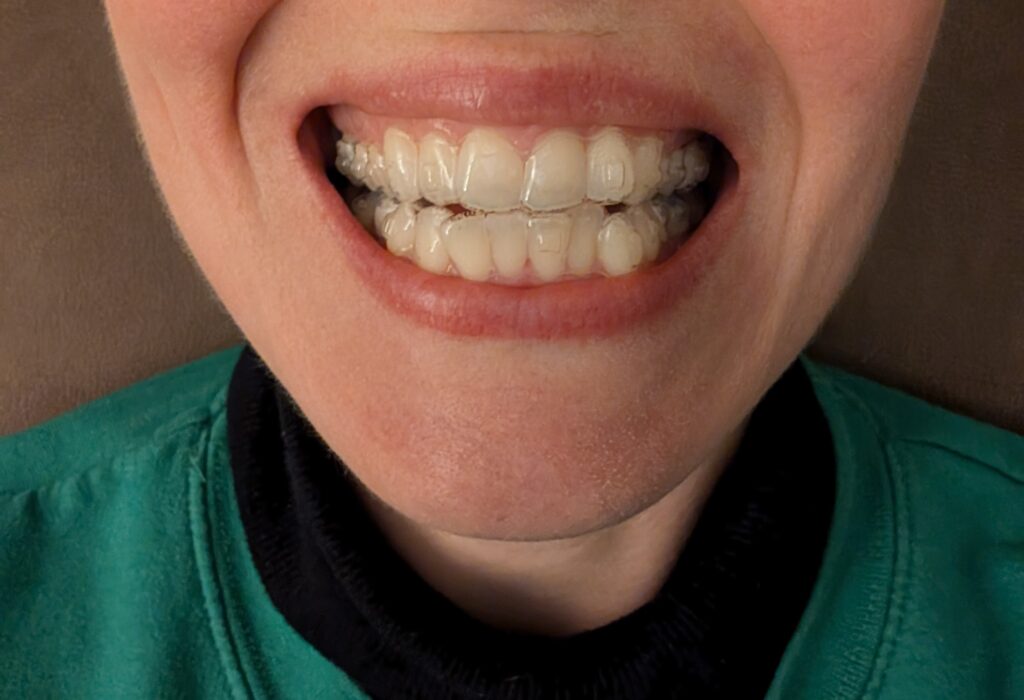
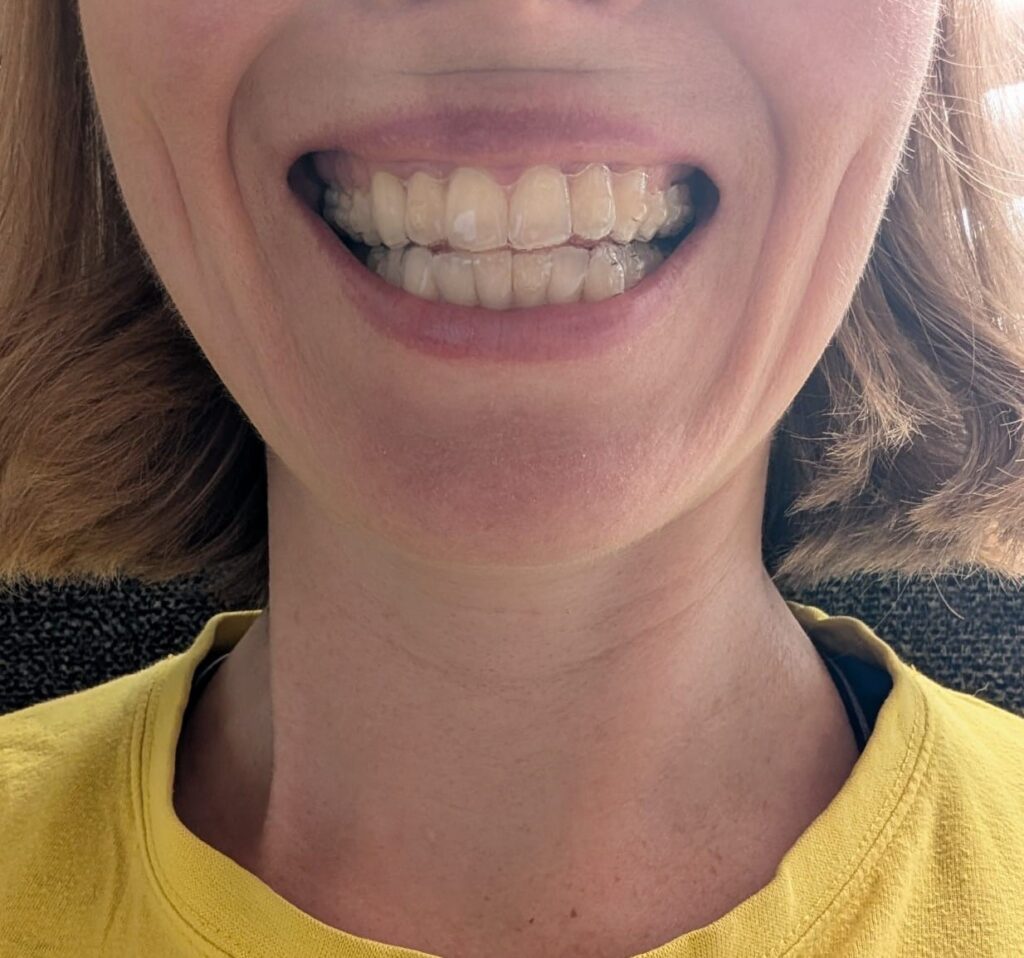
Cons
They are annoying when you are socialising
Technically, you’re not supposed to drink anything except water while wearing the aligners and naturally, you can’t eat anything so if you’re at an event, a wedding, or just having dinner and drinks with friends, they can be a bit frustrating. You have to remove them and do all your eating and drinking within the hour so that you can go back to the bathroom, clean your teeth and aligners and pop them back in for the rest of the night.
They don’t allow for spontaneous snacking
While this is also a pro (see above), it’s a con because I love my snacks! Particularly, a mid-morning cup of tea with two Jaffa Cakes that I’ve had a lot less of since I got my clear braces. That activity no longer takes five minutes. It now involves ‘taking my teeth out’ as I like to say, having my tea and biscuits, and then going to the bathroom to rinse my aligners and brush my teeth. The whole thing could take 15 minutes out of my day and honestly, it’s just not worth the hassle.
You have to have your dental pack with you at all times
There’s nothing worse than leaving the house for a coffee with a friend and realising you’ve forgotten to pack the bag with your case, toothbrush and toothpaste. However, when it does happen, just ask for a separate glass to put the aligners into and clean them and your teeth as soon as you get home.
Strangely enough though, the negative aspects became positives after a while. My eating became more mindful and I couldn’t reach for a few extra Roses out of the tub last Christmas, as is my wont. I’m snacking less and I have become (slightly) more organised when leaving the house.

A Pro/Con
One of the biggest pros to getting Invisalign is that you have much greater freedom while wearing them than with traditional braces. However, that also means that extra care is required every time you remove them. Practice taking them out while you’re at the dentist’s and the best tip I can give you is to hold on to your old aligners at all times. That way, if you do lose or break your current set (or your pet gets their paws on them!), you can pop in the previous pair until you get back to the dentist.
The verdict
I’m so glad that I am getting this dental treatment done. Was it initially about how my teeth looked? Yes. Am I excited that my lower teeth are straight and my snaggle tooth has been tamed? Absolutely. However, the best result for me is knowing that getting Invisalign will hopefully have a hugely positive effect on my dental health for the rest of my life. If having straighter teeth means that I can clean them with greater ease and accuracy, saving myself pain or more serious dental problems in the future, then that is the best outcome I could ever hope to have.

